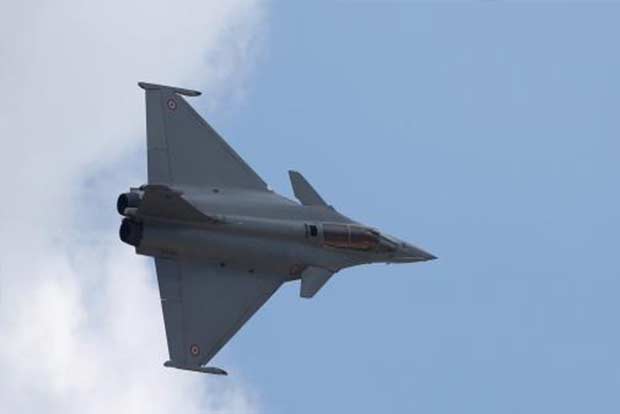Begin typing your search...
MoD panel found Dassault was not lowest bidder: CAG report on Rafale deal
A team of Defence Ministry officials had found in 2015 that Rafale-maker Dassault Aviation was not the lowest bidder for the UPA government's medium multi-role combat aircraft (MMRCA) tender and that its bid should have been rejected at the technical evaluation stage itself, the CAG observed in its audit report on Wednesday.

New Delhi
In its much-awaited report on the controversy-hit purchase of Rafale fighter jets from the French company, the government auditor said the MoD panel had also noted that the price bid of France's Dassault Aviation "was non-compliant as it was incomplete and not in the prescribed format" and a contract cannot be concluded with them.
The panel further found that the proposal from another bidder EADS was also not compliant with the RFP (Request for Proposal), as per the CAG report.
The MoD panel had submitted its report in March 2015, weeks before Prime Minister Narendra Modi announced that India would procure 36 jets under a new deal as against 126 negotiated earlier under different terms and conditions during the Congress-led UPA regime.
Giving a timeline, the CAG observed the RFP was issued to six vendors in August 2007 for procurement of 126 MMRCA, but aircraft of none of the six vendors that participated in the tender meet the ASQR (Air Staff Qualitative Requirement) parameters in the technical evaluation.
The CAG, however, said the ASQR parameters were narrowly defined and in some cases they were also not clearly defined and these shortcomings remained despite seven years having been spent on framing them.
"In the Technical Evaluation conducted in May 2008, five of the six aircraft could not meet all the ASQR parameters... Four aircraft had one to two deviations, Rafale aircraft could not meet 9 ASQR parameters prescribed in the RFP. Further, it did not submit the data for Manufacturers List of Spares and Engineering Support Package," the CAG report said.
Due to this non-compliance, the technical evaluation committee (TEC) rejected Rafale. Later, clarifications were sought from the vendor, but the TEC upheld its decision to reject Dassault's bid for Rafale aircraft again in March 2009.
Subsequently, it was decided by the Ministry to reject the technical bid of Dassault and get waiver of the Defence Minister on some non-compliance to the ASQRs in the bids of four vendors (EADS, Lockheed Martin, Boeing and Gripen).
As this proposal was being submitted for approval of the Minister, the Ministry received in April 2009 a suo moto representation from Dassault for reconsideration of its proposal, stating that it was willing to modify the aircraft to meet all the ASQR parameters and was willing to comply all RFP requirements.
The proposal was sent to the Indian Air Force for further technical evaluation, after which TEC recommended that the new proposal met the RFP requirements.
The CAG said the technical offer once submitted should not be materially changed subsequently, though minor variations which do not affect the basic character of the offer may be accepted.
Besides, no extra time should be given to any vendor to upgrade his products to make it compliant with requirements and the original commercial quote submitted earlier must also remain firm and fixed.
"Hence, Audit noted that the opportunity provided to M/s Dassault Aviation to significantly modify its technical and price bid was in violation of DPP (Defence Procurement Procedure)," the CAG report said.
The Ministry, however, said it was not a violation of DPP and that it was approved by the highest decision making body, the Defence Acquisition Council.
The CAG report further said that after technical evaluation, two aircraft namely Rafale and Eurofighter Typhoon were qualified for further price evaluation and the price bids were opened in November 2011.
After determination of L1 (lowest bidder) vendor during 2012, the CAG report said, there were several complaints alleging irregularity in the price evaluation process, including complaints from MPs.
In May 2012, the price evaluation process, with the approval of the defence minister, was referred to Independent External Monitors (IEMs) who were appointed by the Ministry to oversee the compliance to Integrity Pact.
In their June 2012 report, the IEMs did not find any irregularity in the procurement process and stated that the process was reasonable and appropriate.
However the minister in June 2012 directed that in order to derive complete assurance of integrity of procurement the matter be again examined by a team of Ministry officials, the CAG observed.
This team concluded that the Dassault proposal at the TEC stage was non-compliant to the RFP with respect to the ASQR, warranty clause and option clause and the proposal should have been rejected.
It also said the acceptance of additional commercial proposal after bid submission date for capabilities, which were already prescribed in the RFP, was unprecedented and against the canons of financial propriety.
The panel also said the L1 calculation based on incomplete commercial proposal and on assumptions was incorrect and as such determination of L1 was faulty and not as per laid down procedure.
The committee, therefore, recommended the RFP for the MMRCA procurement may be withdrawn. As a result, the procurement which started in 2000 had made no progress even after 15 years and, in fact, failed on the twin issues of manpower costs and non-guarantee for aircraft to be manufactured by state-run Hindustan Aeronautics Ltd, CAG said.
Visit news.dtnext.in to explore our interactive epaper!
Download the DT Next app for more exciting features!
Click here for iOS
Click here for Android
Next Story



